
VOL. II. No. 13 DECEMBER 1, 1944 FOR U.S. ARMED FORCES PRECENSORED FOR MAILING
B-29 DOUBLE-HEADER POUNDS TOKYO
|
SAIPAN SUPERS HIT CAPITAL 4½ HOURS
WASHINGTON, D.C. - Superfortresses of recently activated, Saipan-based XXI Bomber Command lashed out twice Wednesday night to drop lethal loads on Tokyo, according to a Japanese broadcast monitored here. An offical War Department announcement stated that Tokyo was again bombed on Wednesday, but failed to reveal any of the details. Warning that "The present raids on Japan must be considered to be only the first phase of enemy air attacks," the Japanese commentator said that the initial raid lasted for two hours immediately preceding midnight on Wednesday until almost 2 a.m. Thursday. The second bombing of the double-header got underway at 4:15 a.m. Thursday. Several waves of B=29's flew over the Tokyo area for four and a half hours in last night's raid. Rapidly spreading fires caused by the oversized bombers were subdued just before dawn, the Japanese spokeman claimed. It was offically announced that no Superforts were lost in the latest Tokyo raid. A communique stated: "Industrial targets in Tokyo were bombed on Wednesday by B-29s in the first night mission flown by Saipan-based Superfortresses. The bombing was accomplished by precision instruments and results were not observed due to clioud cover. Anti-aircraft fire was meager and inaccurate. Non of our aircraft was lost from enemy action." |
|
AAF WILL SMASH JAP INDUSTRIES KANSAS CITY, MO., Nov. 29 - "We are going to bomb Japan'e industries into a state of paralysis," Gen. H. H. Arnold, commanding general, USAAF, promised in an address delivered before the National Convention of War Veterans here. The air war against Japan is just beginning, Arnold told his audience. "We are going to destroy the heart and nerve centers of Japan's war machine." Japan will have little industry left when our Army and Navy air forces complete their tasks of destruction, he declared. Gen. Arnold reviewed the air war against Germany and told how 30,000 Nazis south of the Loire river were prevented from attacking Lt. Gen. Patton's right flank when the 3rd Army chief was driviong through France last August. Air power alone accomplished this feat, he said.m Discussing the progress of German scientists on new weapons, Arnold concluded with, "I say sincerely and with the utmost urgency that this war is not over - not by a long shot." |
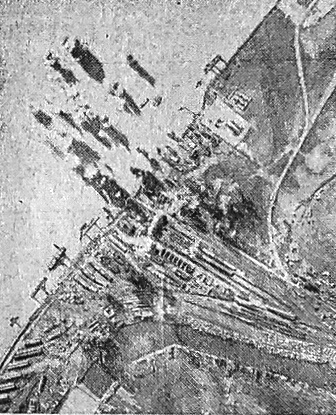 SUPERFORTS OVER NANKING
SUPERFORTS OVER NANKING A burst of bombs from a B-29 Superfortress of Majoe Gen. Curtis E. LeMay's Twentieth Bomber Command drops on shipping and the Tientsin-Pukow railroad terminal on the east bank of the Yangtze river across from the city of Nanking, China. The raid on the Japanese-occupied area was carried out on November 11. (AAF photo) |
NEW YORK, Nov. 30 - The huge Jap-battering B-29 Superforts of the XX Bomber Command which pioneered mass bombing of the Nipponese mainland from CBI, may soon deliver their detruction to more expedient targets, it was suggested in an Associated Press dispatch appearing in newspapers here. Filed by War Correspondent John Grover from a B-29 base in India, the story added that "it is now a matter of legitimate speculation whether the pioneer XX Bomber Command will continue to be based in China."
Pointing out the advantages enjoyed by the newly organized XXI Bomber Command operating from bases in the Marianas, Grover's story emphasizes the advancement made against Japan.
Saipan based Superforts, striking from the perimeter of the inner enemy defenses are able to drop mammoth explosive punches capable of eliminating a target in a single operation. India and China based B-29's attacking Jap industrial targets must sacrifice a portion of their bomb load in order to carry enough gas to complete their record-breaking flights, one of which necessitated almost 4,000 miles of continuous flying - - to Palembang - - the longest mission ever flown by military aircraft.
By contrast, Saipan is within easy range of key Japanese industrial targets and has the added advantage of offering less probability of enemy interception since China based Superforts must fly over enemy occupied China. From Saipan the danger of the oversized bombers of encoutering enemy aircraft is small.
Since the initial Superfort raid last June 5th the XX Bomber Command has completed 18 missions, 13 flying from bases in China. In addition to playing havoc with Japanese production, the XX Bomber Command had delivered up enough technical knowledge to greatly expedite the operation from Saipan.
The behind the scenes story of the XX Bomber Command, the almost impossible preparations which preceded each raid from China provides material for one of the most heroic, majestic achievements of the war.
Every drop of gasoline for the gargantuan ships jad to be flown over the "Hump," with each Superfort requiring almost a railway tank-car-full before a raid. One tankship, of the type now being employed to supply gasoline to
|
Between raids, all equipment including heavy trucks and maintenance gear must be flown over the "Hump" to fields in isolated portions in West China. Mush of the gasoline and dry cargo was transported through the treacherous low-ceiling weather "when even the water buffalo proceed on intruments."
A new assignment for the XXth would in no sense reflect upon the brilliant record thus far compiled by the pioneer Superfortresses unit. Until Saipan became available as a B-29 spring board, CBI was the only spot within a range of Japanese mainland targets.
The XXth Bomber Command struck at a time when Japan was straining every resource to build up her heavy industries and increase war production, and struck with enough force to throw enemy production out of high gear and prohibited the Japs from prolonging the war.
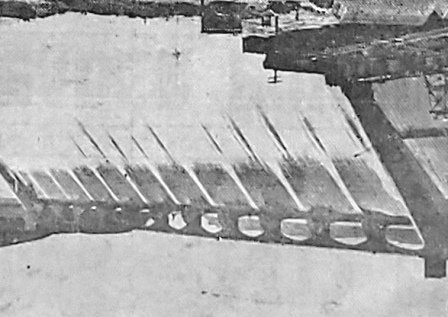 OVER THE DAM
OVER THE DAM Water pouring down the spillway of a mighty dam in the western United States, creating a waterfall almost twice as high as Niagara Falls. One of three U.S. structures that are the biggest ever built by man, the dam diverts water onto 1,200,000 acres in the west. |
SUPERFORTS WEAVING
JAP CAPITAL'S DOOM
LONDON, Nov. 30 - Japan's heavy industry has now had a fore-taste of the ruin which is raining upon her western Axis partner and which may now be expected to develop over Japan itself.
In Germany it has been demonstrated how powerful bombing can wreck a nation's war potential, and there are a vast number of vital targets on the Japanese islands for paralyzing bombardment of the same character.
Factories of every class of industry, iron and steel works, small arms and munitions centers are in Tokyo which, with its population of 6½ millions is the third largest city in the world, coming after New York and London.
The developing air blitz on Japan will not ignore enemy shipping, both naval and merchant. Yokohama and Kobe, which have already had a taste of things to come, have great shipbuilding yards and repair docks.
Besides shipping, Yokohama, with nearly one million inhabitants, is an important commercial center, chemicals, dyestuffs, aluminum, nickel and soya bean products being manufactured there.
At Kobe, also with nearly a million people, is the great Mitsubishi shipbuilding and engineering center, seat of Kawasaki heavy industry, which maintains docks, shipyards and an aircraft producing subsidiary.
"We will pound the Japanese war machine out of existence. Japan has sowed the wind; now let it reap the whirlwind." These fighting words by General Arnold, Chief of the U.S. Army Air Forces, have become battle-cries of the host of airmen to whom no part of Japan is now out of range.
Their battle is just beginning. The "curtain raiser" to the drama of Tokyo's doom promises much.
|
ALLIES ADVANCE IN KALEWA AREA KANDY, Nov. 30 - Today's SEAC communique says: Northern Burma: There was patrol action in all sectors of the Bhamo area yesterday and also in the railway corridor. Chindwin Front: In Myittha Gorge, five miles west of Kalewa, East African Forces have gained ground after capturing a number of Japanese strong points. East Africans are also in contact with the enemy four miles north of Kalewa. Strong support from tanks and Hurrican bombers was maintained yesterday in both the attacks. Troops of the Fourteenth Army have entered Paunghyin river station on the east bank of the Chindwin without opposition. Further east they have cleared a village thirteen miles from Pauinghyin. Arakan: Further Japanese withdrawals are reported from the Paletwa area. |
|
Burma Progress Inspires Optimism LONDON, Nov. 30 - Allied optimism about development of Allied drives in Burma is high. Military experts in Washington are of the opinion that such progress has been made in the last aix weeks that the Japanese hold over all northern Burma above Mandalay is threatened. The enemy's grip even in southern and eastern Burma is seen to be considerably less secure than it was six months ago. While the Japanese still contest strongly the Allied conquest of northern Burma and it is realized that most Allied spearheads and fronts are still without lateral contact, the Washington view is that a situation is developing in which lateral links will soon be possible and all forces will be able to attack along a more or less continuous broad front. |
|
LONDON, Nov. 26 - The mystery of a missing Japanese air force deepens.
While Allied aircraft fly as they like over Japanese territory, a well-equipped and seasoned army is staging invasion of the whole of northern Burma wothout any air opposition from the enemy.
Experts doubt whether the Japanese have 100 planes of all varieties in Burma at present. What, then, is the reason for this lack of air support? Is it simplky that the Japanese just haven't the aircraft to spare, or are thry conserving their efforts for a counter-offensive?
Posing these questions, a correspondent on the Burma front points out that the Japanese have never favored the Allied plan for estsblishing a number of permanent bases with satellite strips, but make bases at strategic points which remain unused until certain operations call them into service, believing in mobility at all costs.
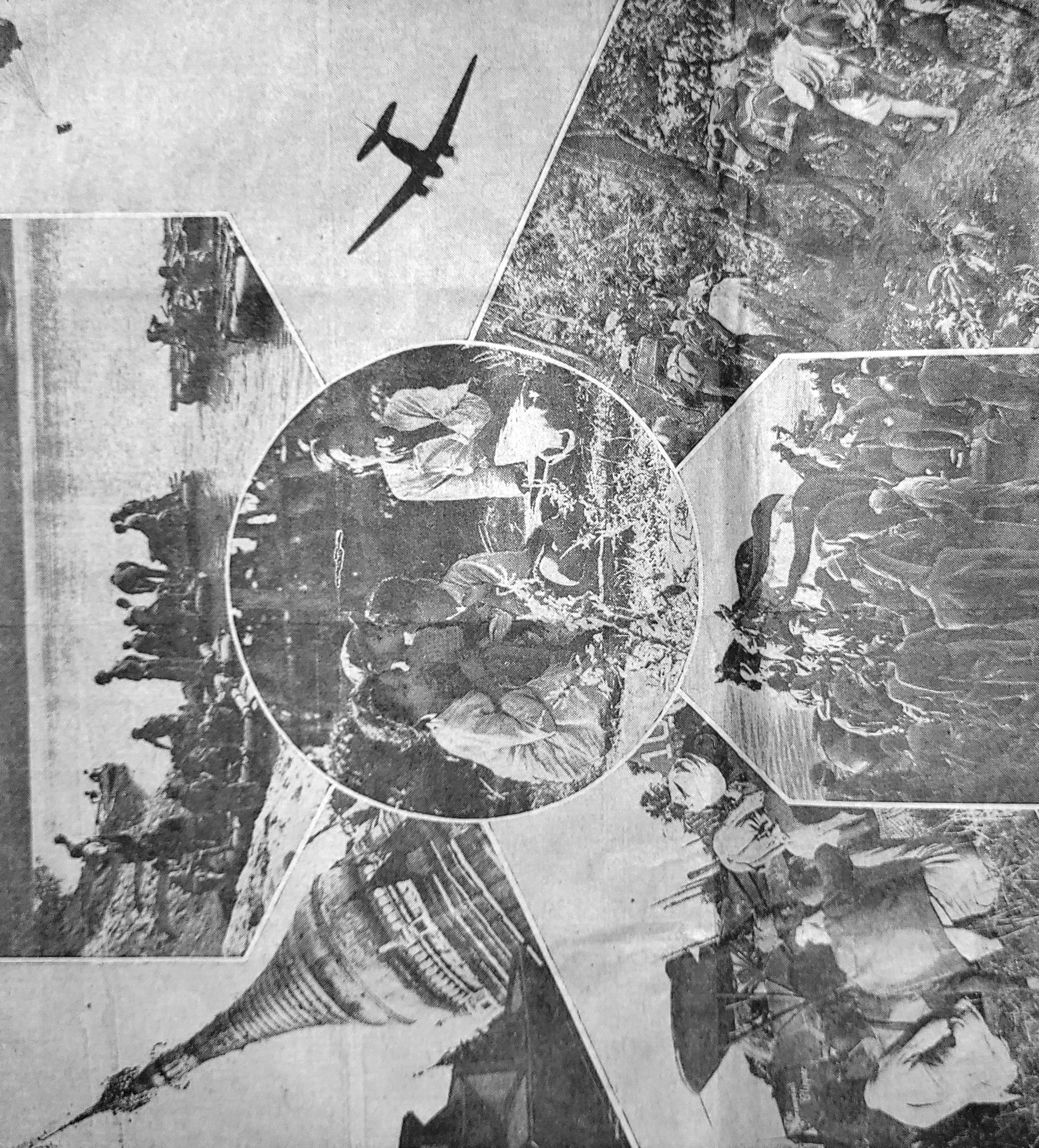 UPPER LEFT ... "one of the most amazing sights I ever beheld, a large, eleborate ... Gold-spired temple ... in glowing brilliance ... in the wilderness" UPPER CENTER ... "assault boats carried the soldiers, the animals and their equipment to the other side" ... UPPER RIGHT ... "Rubber boats, outboard motors, ammunition and rations were dropped by Combat Cargo and Troop Carrier men of the 10th Air Force." ... CENTER ... "signs of their primitive existence could be seen on their faces," ... LOWER LEFT ... "an American L-5 ... the first plane ever to land in Shwegu." ... LOWER CENTER ... "six-ton pontoons transported the horses and mules" across the Irrawaddy. ... LOWER RIGHT ... "after nearly 100 days of marching through such country the Chinese reached the banks of the river."
UPPER LEFT ... "one of the most amazing sights I ever beheld, a large, eleborate ... Gold-spired temple ... in glowing brilliance ... in the wilderness" UPPER CENTER ... "assault boats carried the soldiers, the animals and their equipment to the other side" ... UPPER RIGHT ... "Rubber boats, outboard motors, ammunition and rations were dropped by Combat Cargo and Troop Carrier men of the 10th Air Force." ... CENTER ... "signs of their primitive existence could be seen on their faces," ... LOWER LEFT ... "an American L-5 ... the first plane ever to land in Shwegu." ... LOWER CENTER ... "six-ton pontoons transported the horses and mules" across the Irrawaddy. ... LOWER RIGHT ... "after nearly 100 days of marching through such country the Chinese reached the banks of the river."
|
|
Would-be Napoleonic-complexed world rulers may throw men and machines into deathly combat but ultimately nature determines the course of battle.
In the mountainous, muddy jungles of Burma, nature has barred the way to modern 'panzer' tactics and imposed a style rooted deep in the tradition of the ages. In an era of paradoxes, it is not too incongruous that peaceful scenes of natural beauty should provide the backdrop against which the Allied drive is expelling the Japs from Burma. Nor that the same immovable objects of nature should act as barriers obstructing the pace of the drive.
After nearly a hundred days of marching through such country, a force of the new Chinese Sixth Army reached the banks of the Irrawaddy river, which was to serve as the springboard for the drive to capture the city of Shwego in northern Burma.
Untamed jungle brush, absorbent sucking swamps, the rays of the sun and the penetrating damp chill of the valleys had to be overcome before the river flowed into view.
With muscle-bending packs on theor backs and their soldier-like horses and mules loaded to capacity, the 'ding-hao' boys might logically enough have pleaded exhaustion before launching their amphibious attack. But if the slightest trace of weariness existed, it failed being obvious.
I joined a column of Chiang Kai-shek's warriors some miles before they reached the river and found them fearless and comletely imbued with the vitalness of the battle ahead.
A small team nof American Engineers arrived at the Irrawaddy with an anvance contingent of the new Sixth Army force and immediately set to work floating numerous assault boats to carry the soldiers, the animals and all their equipment to the other side.
As a prelude to the mass movement of troops two assault craft carrying a small vanguard of the poised Chinese force quietly crossed the river, scouted the area and flashed a pre-arranged signal which set in motion the full scale amphibious attack. For the first time in three years Allied troops set foot on what until that moment had been Japanese occupied territory. Time accelerated the tempo of the crossing and in less than an hour a cavalcade of rubber boats began an unending river transport operation which lasted through three nights and three days until the entire liberating force had crossed the river. In the main operation, each 'boat' was equipped with an outboard motor.
Two rubber craft, held together by cross-beams hued from the jungle, with an outboard motor placed in the center of the rear beam, comprised a 'boat.' Heavier pontoons of the six-ton variety usually used for bridges were joined in the same way to transfer the horses and mules.
An immense operation, the crossing was made doubly difficult by a military secret number of unsympathetic animals not sufficiently impressed with the vitalness of the mission and lacking confidence in the rubber craft. Truly products of American ranchers, many of them bucked in the best cowboy traditions.
On the other side of the river a much exalted Jap army failed to live up to their billing. Only sparse, token resistance was offered. Planes of the USAAF had preceded the Chinese, cast shadows and bombs over the territory and denied food, ammunition and medical supplies to the enemy. With telling effect they had accomplished their mission. Well placed bombs paved the road for the Chinese force which followed later. Ill-fed, ill-clothed and driven with fear, the Japs pulled stakes and ran before the Chinese assault.
Shwegu, a clean, colorful city, neatly located in a jungle clearing, was occupied on the day following the river crossing. Ruins of a few houses in ashes gave silent evidence of the preinvasion bombimng which forced the Japs to retreat and laid waste their supplies.
The majority of the Burmese were not on hand when the Chinese liberators marched into their city; they had sought the cover of jungle camouflage, fearing not only Jap cruelty but the explosives dropped by American planes.
On bthe second and third days the people of Shwegu slowly entered the city from their jungle hideouts. Signs of their primitive existence could be seen on their faces and bodies.
In over a decade of reporting, I have never seen a better example of human triumph over the most extreme cruelties of nature. Burning with fever and ravished by disease, the people of Shwegu weighed the harshness of nature against Jap cruelties, chose the former, and won. For more than three months a sizeable number of the Shwegu community lived on a miniature, hard-to-find piece of land in the middle of a jungle swamp. Their menus were dictated by the meager rations they carried with them or by the little food they were able to smuggle back under cover of dark Burma nights.
The invisible but sure hand of God on more than one occasion descdended from Heaven and reached into the marshes to safely bring new lives into the universe. Almost a dozen children, born in the slimy, damp purgatory survived malnutrition and persistent tropical diseases.
I saw one two-and-a-half-year-old child whose body was so disfigured with jungle sores the skin was hardly discernable. His mother and father were so weak from lack of food and so fever-ridden, walkiomg was a great effort.
Money had no value in Shwegu. A few of the wealthier inhabitants who had buried their pre-war currency and gold prior to the advent of the Japs, begged for food when the Chinese entered their city.
Before long American planes gave their answer: substinence was airdropped to the Burmese.
As in most other Burma operations, the new Chinese Sixth Army force going into Shwegu was totally supplied and fed by air. Rubber boats, outboard motors, cigarettes, ammunition and rations were dropped by the Combat Cargo and Troop Carrier men of the 10th Air Force who maintained an uninterupted flow of aircraft over improvised fields. With preceision marksmanship they parachuted supplies into the jungle. Very infrequently did the surefooted QM 'kickers' fail to hit the bullseye.
Kyundaw, a small island in the middle of the Irrawaddy between Thinbawin and Shwengu provided an interesting and unexpected jungle, strange interlude.
With three American Engineers I was the first to step on to the island's sandy beach since the Japs occupied it three years ago. We had heard rumors of a hlf dozen Japs still at liberty on Kyundaw and so we made our way cautiously. As we left our boat and headed inward, each of us placed cartridges in the pistol and carbine chambers of our now ready weapons. The precaution was unnecessary, we found not Japs but friendly, slightly startled natives who treated us as guests rather than intruders.
After a few minuted they led the way along a winding jungle trail which culminated in one of the most amazing sights I ever beheld: a large, elaborate,
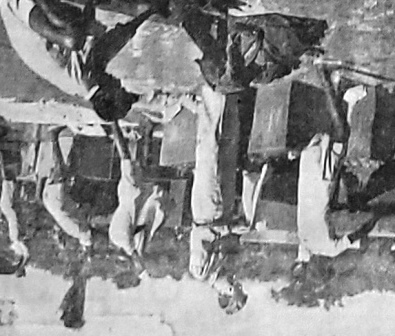 GI DHOBI-WALLAH
GI DHOBI-WALLAH Sgt. Kenneth Fowler, Riverdale, Md., supervises the dhobies at a XX Bomber Command base in India, and tries to keep down the motality on buttons as the natives use their primitive methods to get GI khakis and fatigues clean. (AAF photo) |
One of the islanders, educated in Rangoon, spoke English and explained that the temple was one of Burma's biggest, stretching from one side of the island to the other. Climaxing this unexpected discovery was a complete modern generator which produced enouigh electricity to flood the temple in glowing brilliance. Undoubtedly, this solitary touch of civilization in the wilderness is the only one of its kind within huindreds of miles of Shwegu.
A clearing was levelled immediately following the Chinese occupation of Shwegu and an American L-5 - the first plane ever to land in the city - made a perfect three point landing. The sight of man-made wings attracted numerous, amazed Burmese. They crowded around the tiny craft and stared unbelievingly until nightfall blacked out the made-in-America winged "miracle."
The next day airdropping began on the outskirts of the city, providing another unbelievable dramatic instance in the lives of the inhabitants of Shwegu. Whenever a QM 'kicker' sent a parachute through space, his "audience" clapped hands in sincere admiration.
For months the had watched ominous death descend from the clouds. Now they were watching life-giving food descend from the same sky, and their unshatterable faith in their God was being confirmed.
A few days later the soldiers were packing their guns and harnessing their animals to march again and re-affirm the faith of other Jap persecuted Burmese still confidently praying in other jungle wildernesses.
|
McClure Succeeds Hearne In China CHUNGKING, Nov. 30 - T he Associated Press said it was announced that Maj. Gen. Robert B. McClure who commanded an American division in the Southwest Pacific has been appointed Chief-of-Staff of the United States forces in the China theater. He succeeds Maj. Gen. Thomas G. Hearne, who is leaving for the United States for a new assignment. Maj. Gen. Claire L. Chennault has been made advisor to the Commanding General of the U.S. forces in China in addition to duties as commander of the 14th USAAF. |
Judean Club Opens
New Wingate Canteen
A completely-streamlined, bewly-renovatede Judean Club held a grand reopening last night with Captain David Seligson, Jewish Chaplain, officiating at cerminies marking the dedicatio of the club and the new Wingate Canteen.
A large crowd of Jewish servicemen and women were present at the reopening cereminies and the formal dance that followed, on the invitation of the members of the Jewish community.
The new outdoor Wingate Canteen plans to serve many of the dishes familiar to Jewish home life, and the club intends to embark on a new program of dances, concerts and discussion forums for the servicemen of the area and those visiting from out of town. Complimentary memberships to the club are offered to all Jewish servicemen and women.
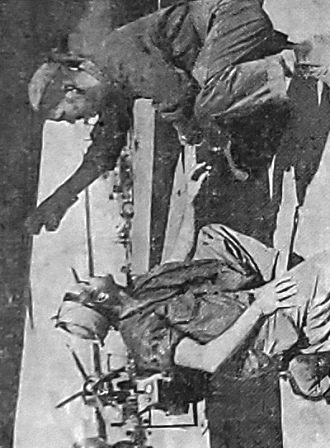 SUPERFORT SAVERS
SUPERFORT SAVERS Looking at the portion of the B-29 belly damaged by a loose tank which they hacked off with a hatchet at the risk of their lives to save the plane during a recent Superfort mission are (left to right): S/Sgt. James W. Garr, Chillicothe, Mo., and S/Sgt. Gerald Tefft, Craigtown, Idaho. (AAF photo) |
Gunners Save B-29 From Certain Loss
A 20th BOMBER COMMAND BASE, INDIA - Perched precariously without parachutes in an open bomb bay, two B-29 gunners from the 20th Bomber Command's Billy Mitchell Group braved stinging wind and rain - and certain death if they slipped - to chop loose a dangling auxilliary fuel tank and save their Superfortress from "ditching" at sea during a recent mission.
The incident occured after the Singapore-bound Superfort piloted by Capt. Paul K. Carlton, Erie, Pa., lost an engine and turned back after its bombs were salvoed over water.
S/Sgt. Gerald K. Tefft, Craigmont, Idaho and S/Sgt. James W. Garr, Chillicothe, Mo., crawled into the open bomb bay to dislodge a tank which had failed to drop clean and was hanging half off its shackles. The tank was banging against the bomb bay doors, causing a drag which pulled the B-29 towards the water.
Working with fire hatchets in total darkness, hampered by driving wind and rain and the loose tank's furiously lashing cradle harness, the two gunners hacked away for 15 minutes before the tank finally fell free.
The plane was only 700 feet above the water when its descent was checked. Captain Carlton, who landed the bomber on three engines a few hours later, declared "ditching" would have been inevitable if Tefft and Garr had not worked the tank loose.
XX Bomber Crews Paved Way For Saipan Superforts
By MAC WRIGHT
United Press War Correspondent
While personnel of the Twentieth Bomber Command may look with envy at the comparative lack of difficulties facing their brothers of the Twenty First Bomber Command, they are consoled by knowing it was their pioneering which made possible the success of the B-29 Superfortress.
During the last six months Twentieth Bomber, first Superfort outfit to go into action, has flown combat missions of a greater distance than twice around the equator. These missions were made under the worst supply, weather, and geographical conditions which have faced any bomber group.
It has been these conditions which led to the present high development of the long range bomber which Major Gen. Curtis E. LeMay, Twentieth Bomber commanding general, terms "the weapon of the future."
"We have evolved the tactics of Superfort bombing," Gen. LeMay explained and added that the experience of this organization helped to establich the best flying techniques and methods of protecting the bombers.
"Through experience, again, we have ironed out most of the mechanical difficulties encountered in combat flying," he continued, "and have solved many engineering problems."
This vast store of information thus accumulated has been funneled back to Washington woith the result that Twenty First Bomber went into action with tried and tested techniques."
General LeMay explained that the first contribution his organization masde to the Pacific campaign was to force the withdrawal of Japanese airpower from their various fronts to protect their homeland.
Since the first raid June 5 they have hacked away at Japanese production and supply at an ever increasing tempo. Two raids each were made in June, Juky, and September. Three were made in August. October saw four raids while fivbe missions were carried out last month.
Principal war industries, with emphasis on aircraft and including steel, railway repair
|
These attacks include the longest ever made by bombers when the Superforts struck Singapore from Indian bases, a distance of approximately 3,800 miles - comparable to a flight from New York to Salt Lake City and return.
Average length of the 18 missions of the first six months was 2,900 miles. This can be compared to the longest raid ever made by other type bombers - from Midway to Wake - which was 2,400 miles. The aveage Superfort trip has been similar to a round trip from New York to Galveston.
In addition to the long combat missions Superforts on 13 of the raids had to travel to forward China bases equal to the distance from New York to New Orleans. Their shortest raid - Rangoon - equals a round trip from New York to St. Louis.
In addition to traveling over some of the roughest terrain of the earth's surface the B-29's of Twentieth Bomber cover an average of more than 1,000 miles over enemy occupied territory - in which there are fighter fields - on each mission.
While no type of plane so far has proven invulnerable to enemy attack the Superfort approaches that optimum. This is attested by the experience of a reconnaisance by a single plane which beat off the attacks of almost 100 fighters and claimed seven Japs with two probables.
It has also been proved that these planes can stand rough weather. While most of the planes sent on the Armistice day raid were redirected after takeoff to Nanking, several did not getthe signal and continued over Omura - the original target - and dropped their bombs despite a "quick hurricane" - and rode out the storm to return safely.
|
|
By HUGH A. CRUMPLER United Press War Correspondent
A B-29 BASE, NORTHWEST CHINA, Nov. 30 - "How do you like China," I asked a GI aircraft mechanic who has been in the land of lotus blossoms nearly two years.
"Well, Bub," he said, "I been away from the States so long I plum forgot what home looks like, but compared to India this here's paradise."
"I got plenty gripes about China, if you got a couple hours to hear 'em, but the people are friendly and cheerful and hard-working and they don't kow-tow every time you come walkin' down the street like they do on the other side of "The Hump."
"They do a lot of damn fool chattering, it seems to me like, and they're runnin' this 'ting hao' ("okay") business in the ground, but for my money the Chinese are all-right folks."
"Now you take that soldier there. He's got a rifle and a quilted uniform that makes him look like a bed that took a notion to get up and start walkin' around, but he ain't wearin' no socks under them grass sandals and it's coldern blue blazes right now. I can see you appreciate that or else you you been drinkin' this jing bao (air raid) juice, because your nose's reddern Tojo's face.
"But no matter how cold it gets that guard is always grinnin' and 'ting bao-ing' all over the place, I seen him do a couple of pretty bad things bit i guess it's his job to make these coolies behave and I don't intend to interfere. Whe one of 'em takes it in his head to run from the guard he knows how to use that bayonet just enough in the right places to keep him runnin' unti he's tired himself out.
"He caught a couple of 'em stealin' the other day and he tied their hands behind them with telephoine wire and then strung them up on their toes for a couple hours. It wasn't exactly what we'd call humane back home but I bet it cured 'em of their takin' ways.
"It seems to me like the Chinese are bound to be the hardest workin' people on earth because I don't see how it'd be possible to put in any more time than they do. Them coolies swarmin' all over that airstrip do everything by hand, includin' breakin' up the rocks and sortin' out the gravel but they get the job done with a grin.
"You see farmers ushin' live hogs to market on a wheelbarrow so they don't lose any weight. They oush them
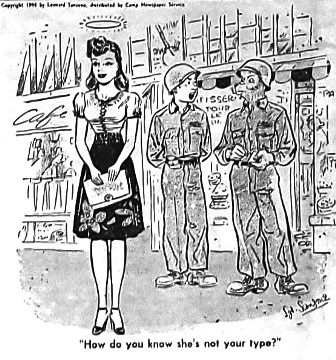
|
"By now you probably got a pretty good idea that me and the Chinese ain't got any shootin' differences and we ain't. But when I said this place's paradise I had a couple 'buts' to throw in.
"In the first place some ignorant schoolteacher told me China's in the Orient and the Oruent's hot. This here part of China must have seceded from the Orient because if there's a colder place anywhere I don't believe it and I sure's hell don't wanna be there.
"China's been at the end of the supply line a long time now and I guess he'll stay there awhilw longer. Aside from three cartons of cigarettes and one can of juice and soap and toothpaste we don't get much in the way of PX rations any month. I ain't seen a bottle of beer in three months and when I get back over "The Hump" I'm gonna make up for them three months and fill myself up with another three months reserve just in case.
"The social life over here ain't gonna wear no man out before his time. You might say it's confined to movies and bull sessions and the bull sessions are mainly confined in one subject but I wouldn't hardly say they're monotonous.
"If you got any kinda eye for pretty girls you can see some of these here China are nice to look at. But you gotta be careful, though, or they'll get you in trouble but if you just shop around long enough you can sure find yourself a nice one, maybe.
"Hey, U.P., you better hadn't quote me. There's one thing about the States I haven't forgotten and there's a sweet little girl back home and I don't want her gettin' any wrong ideas about the Orient like I did."

The B-29's have opened their attacks on Japan from the Pacific. The raids should come fairly often and with incresing effect. Japan needs ships and planes nadly; we will certainly strike again and again at her productive centers for both. Meanwhile, perhaps the greatest single effect of these raids on the Land of Nippon will be the informing of the Japanese themselves; American bombs will replace Jap lies as sources of information for a people who have been told repeatedly that the are waging a tough yet successful war.
In Burma there are increasing signs of Japanese collapse. Enemy units are weakened and badly under-manned. Nowhere does the Jap appear to be attempting to offer more than mere delaying actions as the Allied Armies press ahead on the Central and Northern Fronts and in the Salween sector. Lashio might well be in Allied hands close to the beginning of the new year. In fact, nif the Japanese want to hold at all in Northern Burma they will have to pour a ot more strength into that area "right now." We question whether they have such reinforcements ready at hand.
Over in China the foe's latest thrusts into Kweichow Province come as something of a surprise in view of his already greatly extended lines. One wonders if the Jap really intends to reach Kweiyang and then continue westward toward Kunming to nullify Allied successes in Burma? The thrust by the enemy from Paoching seems headed for Chihkiang as an immediate objective. Paced by these latest amphibious thrusts into their very backyard, it would appear reasonable to suppose that the Chinese must at last summon from somewhere a real counter-punch-perhaps, a surprise one. - Lt. Phillip E. Johnson
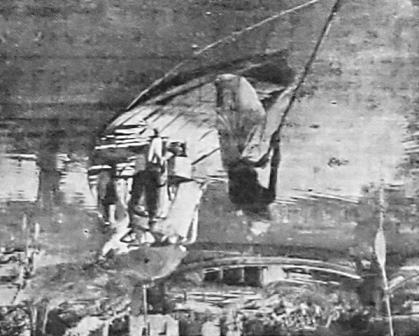 CALCUTTA FERRY
CALCUTTA FERRY An undetermined number of ferry boats, similar to this one, shuttle back and forth across narrow streams in and around the Calcutta area. Travel is free - with the compliments of the municipality. A fabulous number of the population take advantage of the 'bakshees' service annually. |
One Way To Solve Base Ice Shortage ATC BASE, INDIA - Corp. Linnard Ugstad, of Duluth, Minn., found one way to lick the ice shortage at this station, which was imperilling a medical unit's serum and vaccine supply as well as depriving thirsty throats of a cool coke or beer. From spare parts and salvaged junk he and a few other GIs built an ice-plant which turns out 250 to 300 pounds a day. Not only was the hospital crisis averted, but the surplus has been found adequate to provide cold drinks and refrigeration in the mess halls of the unit, a medical air evacuation squadron attached to ATC. |
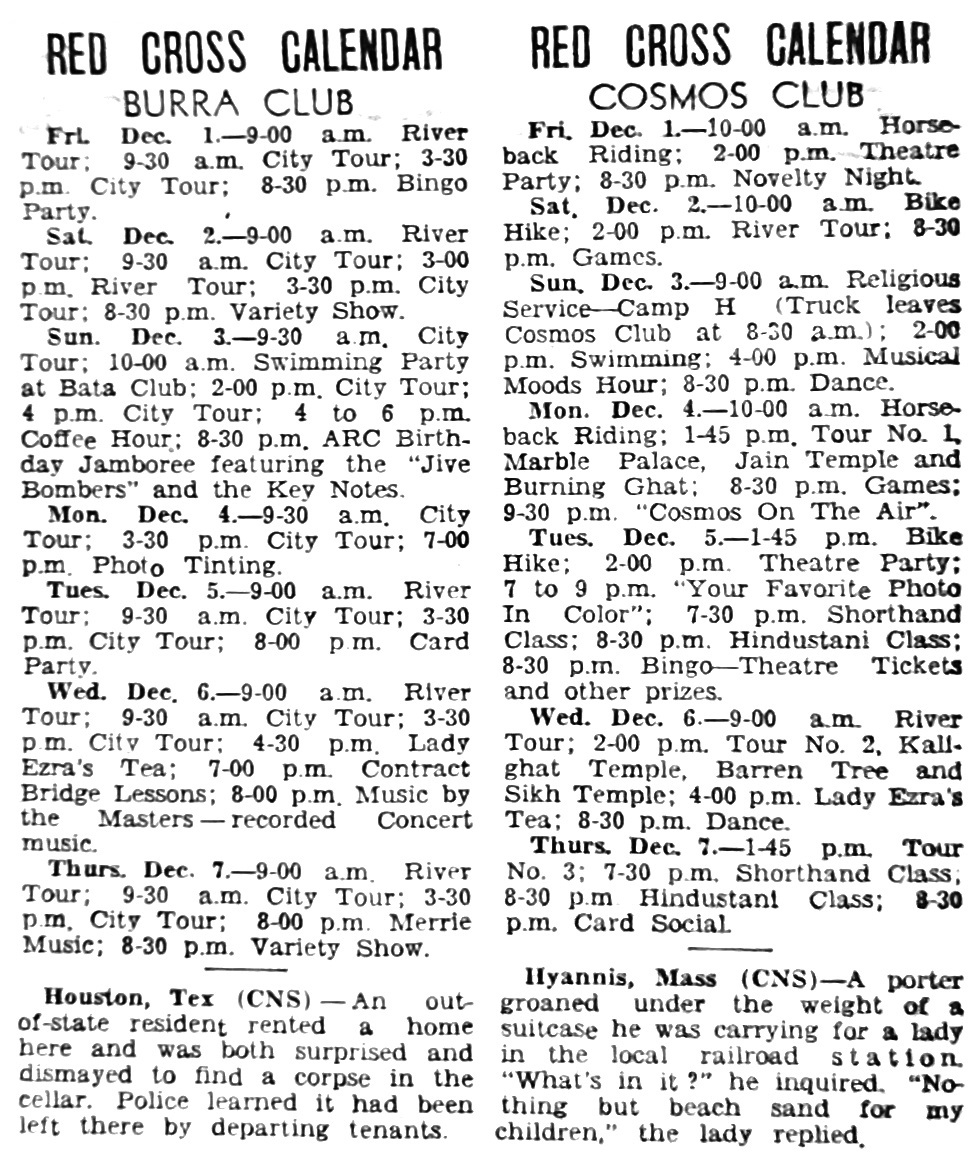
|
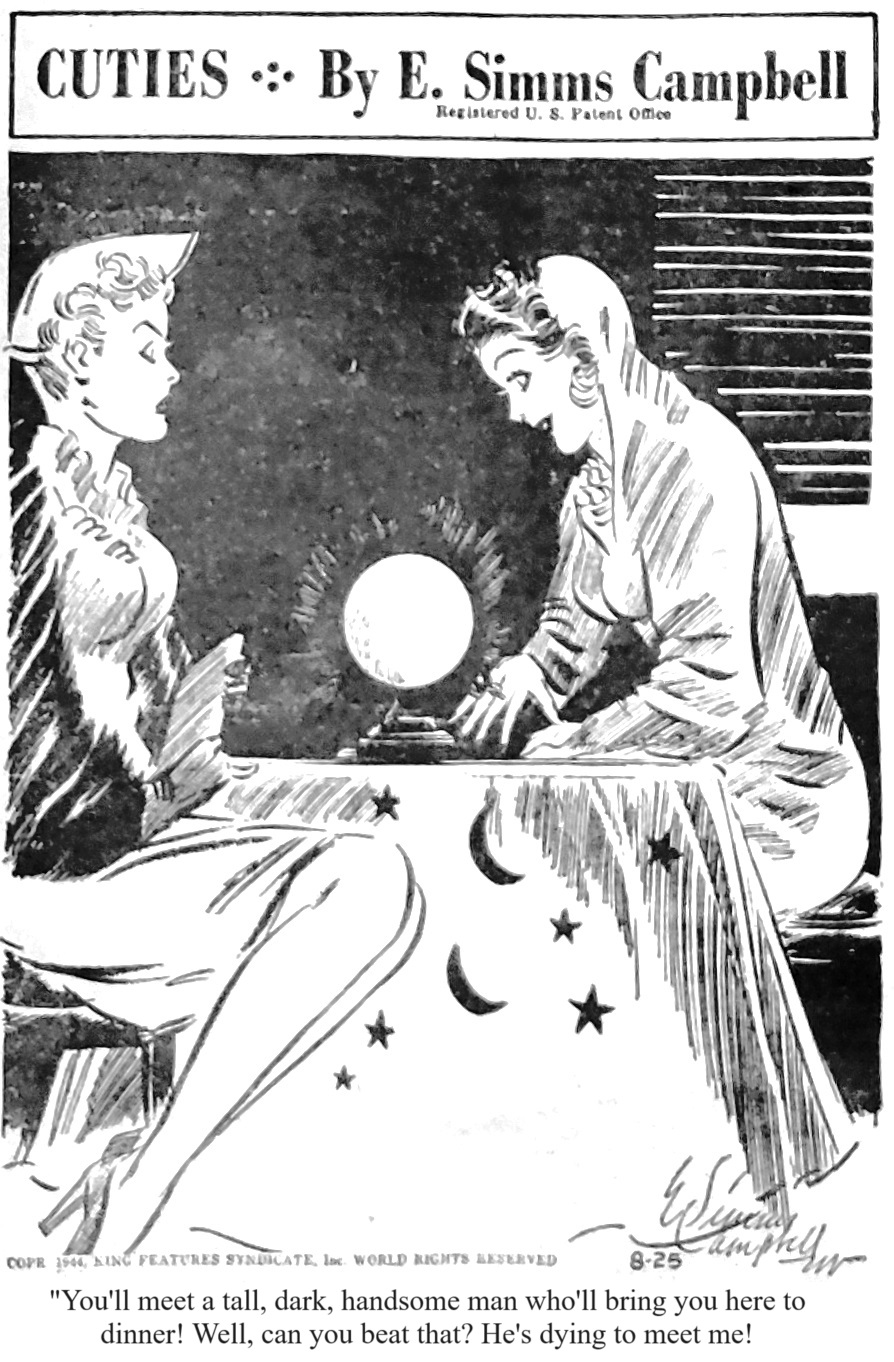
|
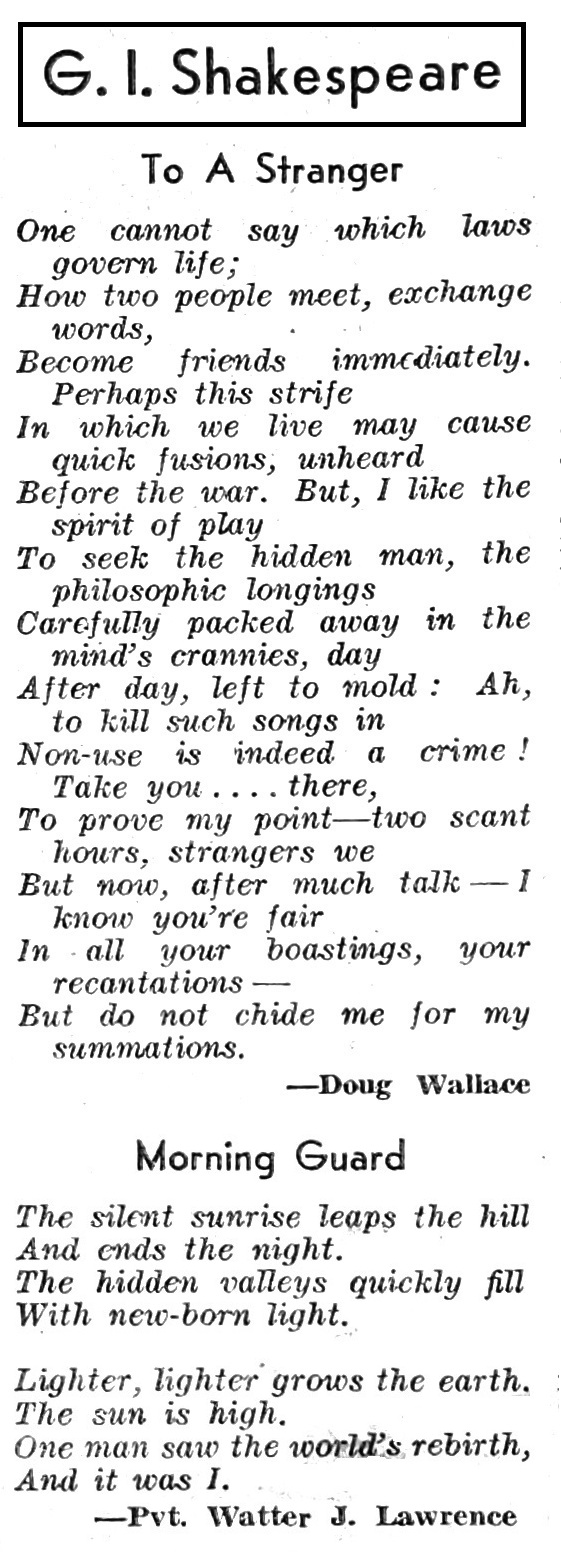
|

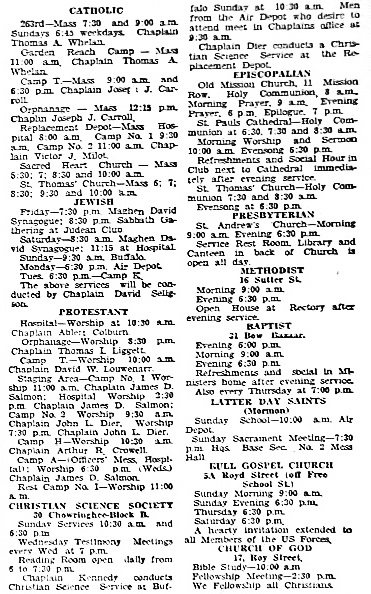
|
William Conyer, Baltimore, Maryland George P. Campbell, Washington, D.C. L. D. George, Wortham, Texas Lloyd Carlton, Stab. Ringwood, N.J. John E. Burkett, Augusta, Georgia Lawrence E. Anderson, Tyronza, Arkansas Ronald P. Pritkin, Chicago Paul P. Polk, St. Louis, Mo. Walter P. Bogielczyk, East Chicago, Indiana |
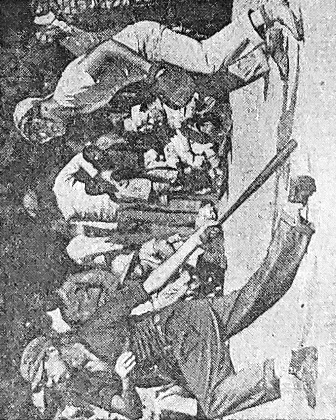 CLEAN SINGLE
CLEAN SINGLE Jim Ripp, MP clouter, smashes out a single in the softball game Sunday between the MPs and the Eagles. The MPs won easily 6-0. Watching the hit on its way out to right field is Miller, the Eagles catcher. (Signal Corps. photo) |
MPs Meet Giants For League Lead
What is desdcribed in the environs of Ebbets Field as a 'crushial' game takes place this Sunday at 1400 hours at the Diamond at the Miadan when the MPs meet the Giants in the game that will decide first place in the American Softball league.
Both teams have a record of eight wins against no losses in league competition, and barring a stunning upset in the final few games the winner should be the league champion. Another battle for third place pits the Orphans against the Skyliners.

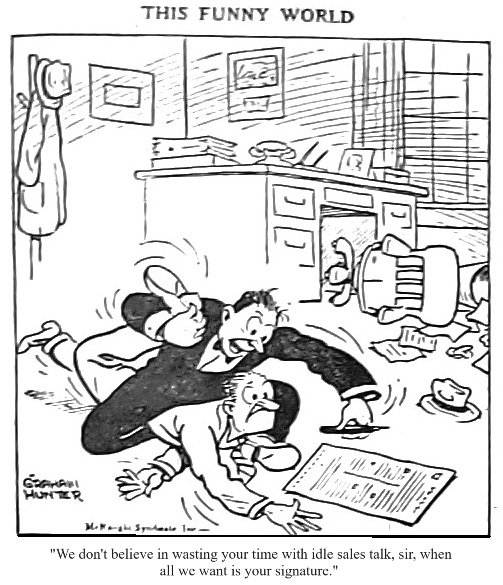
|
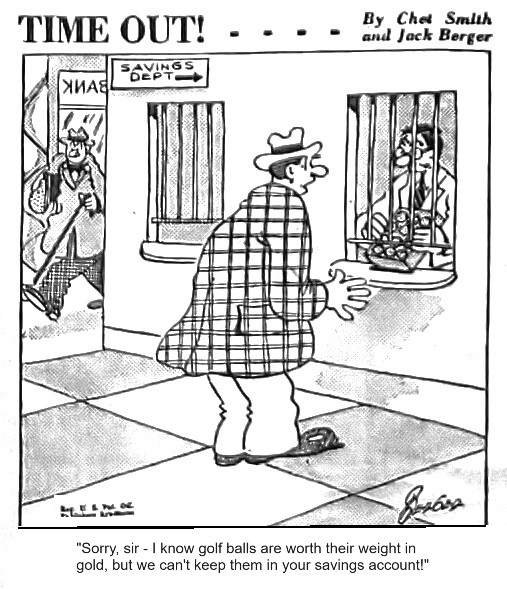
|
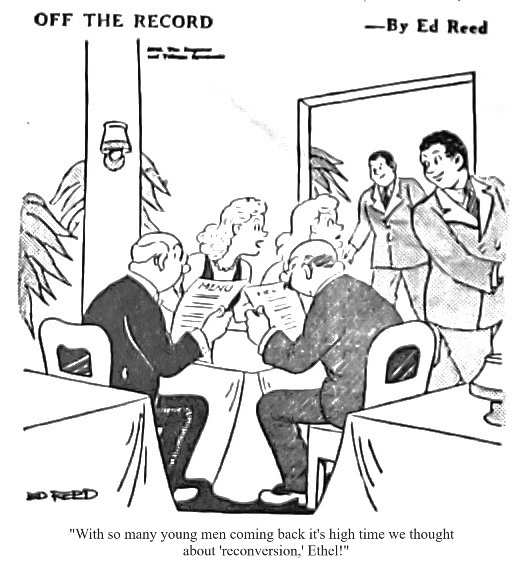
|
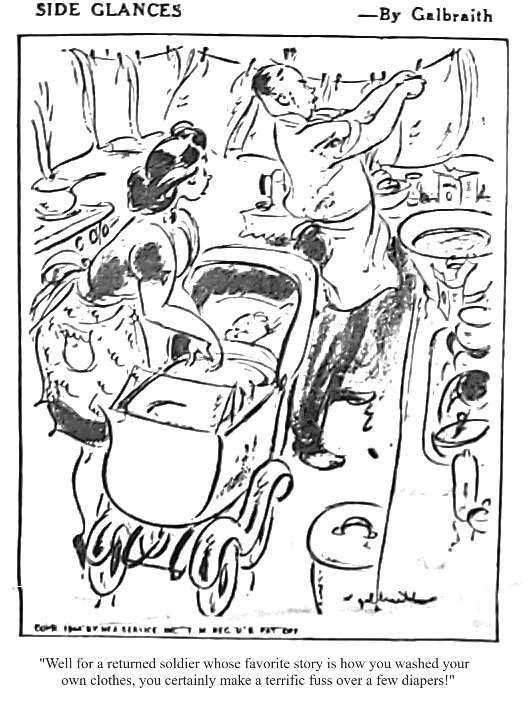
|
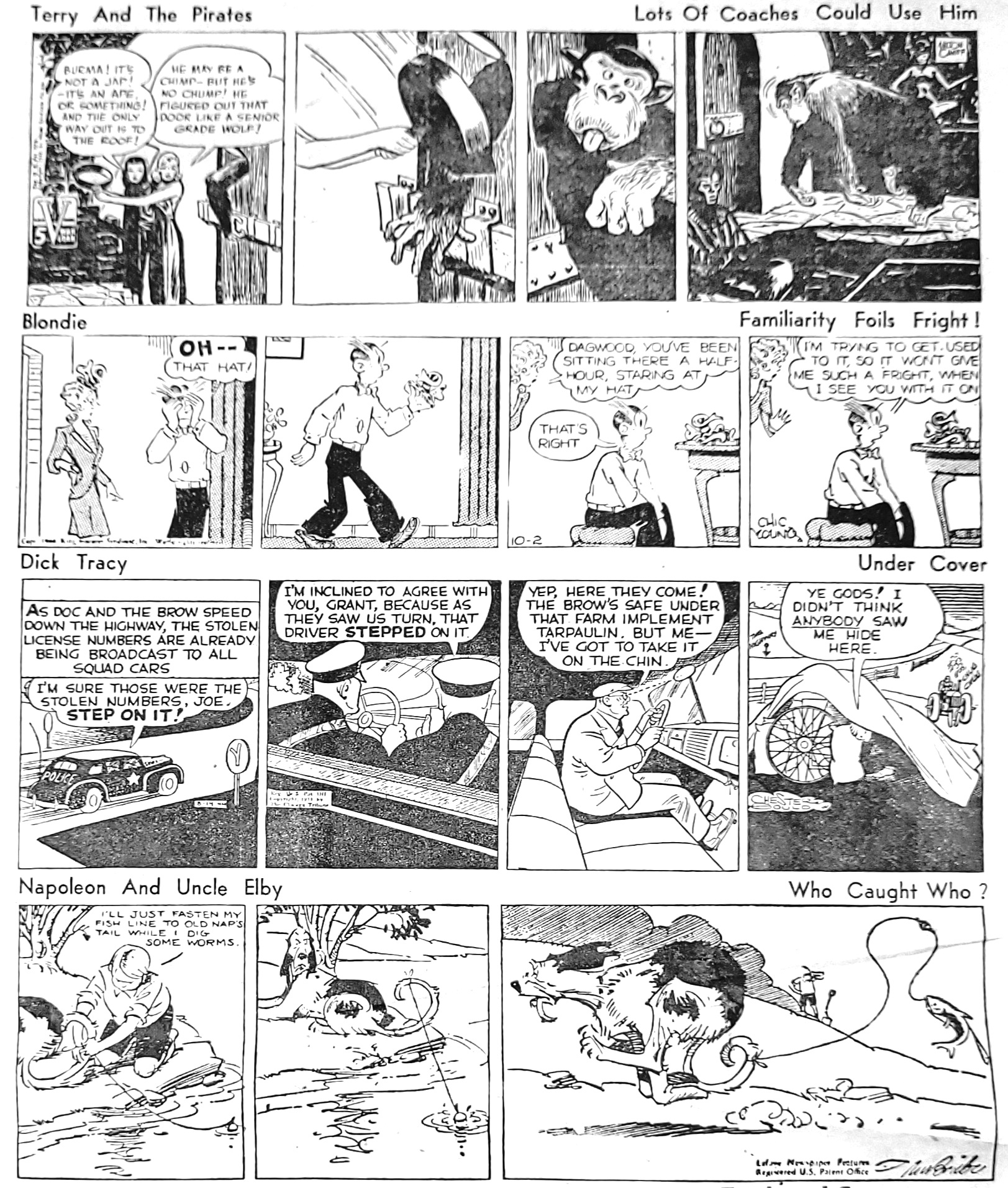
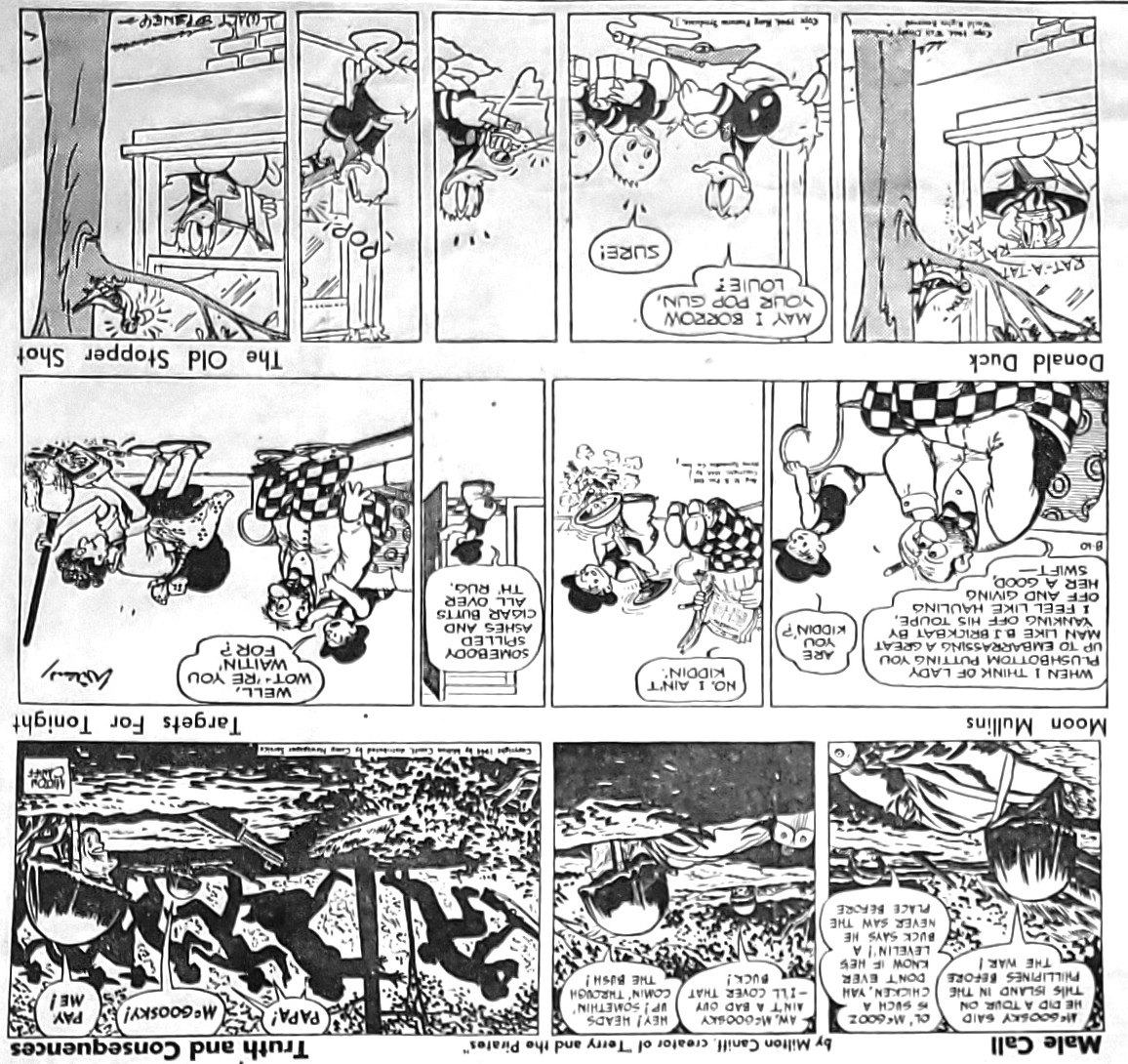

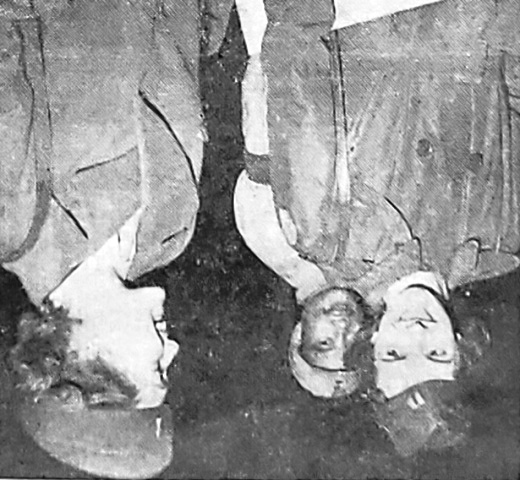 FIRST WACS IN TEALAND
FIRST WACS IN TEALAND
Capt. Elisabeth M.Lutze, Sheboygun, Wis., left, and Lt. Florence Bullitt, San Jose, Calif., at the Chuingking Airport ujpon their arrival at the Chinese capital. Although American nurses and Red Cross girls have held down assignments in China for many months, the arrival of the two officers brings the first American WACs to tealand. (Signal Corps. photo)
|
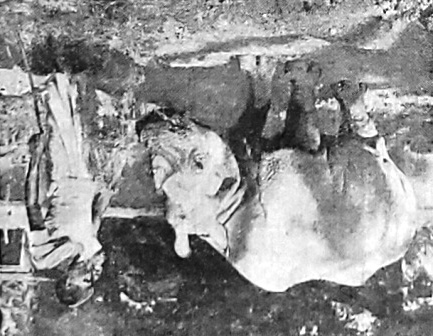 STATESIDE BOUND
STATESIDE BOUNDBound for a zoo in Washington, D.C. is "Olga," an 1,800-lb. rhinocerous, which has been the property of the United States Government for six years. The rhino was captured in the jungles of northern Assam. Major W. J. Sherwood of Washington, North Carolina, will accompany "Olga" to he destination. (Signal Corps. photo) The three pictures below, caught by ace NEA-Acme lensman Frank Cancellare, dramatically portray China's civilians in the path of the Japanese advance. Along every highway leaving Liuchow, on every train out of city, evacuees puched on in plentiful streams. "Women ch'ih k'oo" (We eat bitterness) is the peasant's customary greeting. Here the legend is personified. |
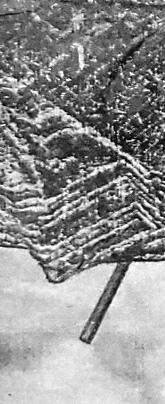 "LONG TOM"
"LONG TOM"A camouflaged U.S. 155mm "Long Tom" gun hurtles powerful missile against Nazi positions in Germany during the 100 mile Allied offensive now in progress on the Western front. (Radiophoto) |
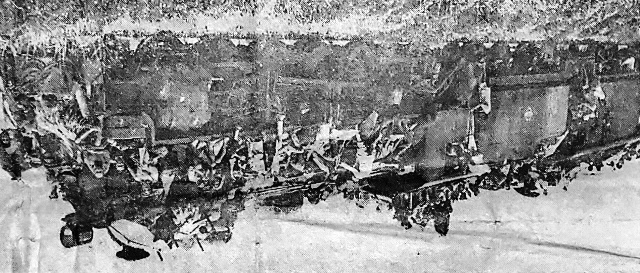 EVACUATION EXPRESS
EVACUATION EXPRESSAs Jap troops converged on Liuchow from the north, south and east, the long-suffering Chinese civilian population prepared to flee. For weary thoudands, no transportation could be provided. A lucky few shown in these remarkable photographs taken by NEA-Acme photographer Frank Cancellere, crammed every inch of the space on a freight train loaded with human cargo. They clung to their babies, to a few scraps of food, to such pathetic luxuries as the parasol shading the yougster cuddled close to the smokestack. From locomotive to caboose, wherever their fingers could hinge on, refugees clung to the train. 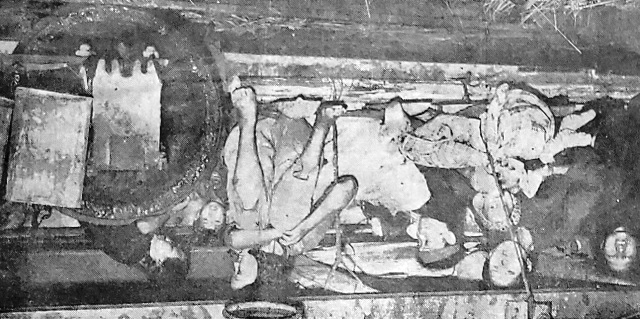 HOME
HOMELiving quarters are cramped, but this Chinese family, refugees from Liuchow, has managed to make the rods of a freight car liveable. Wherever he turned, Frank Cancellaew NEA-Acme photographer, could train his camera on scenes like this. |
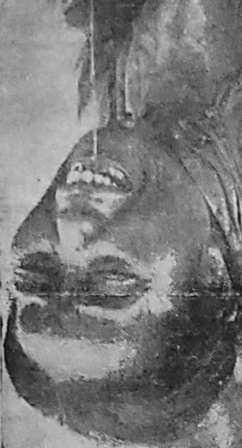 SORROW
SORROWFor the most part, the stoic Chinese suffered silently. This heartbroken, slobbering mother could no longer restrain the flow of her bitter tears. Somewhere, sometime, the peasants must find a place that's safe from the Japs, where they can till the soil in peace once more. For many refugees there was no room on the train leaving Liuchow and the had to plod alongside the rails with other thousands who raced as swiftly as they could to escape the Japs. Foot-sore and weary, they carried as much of their worldly goods as they were able to transport on their backs. |
THE COMMAND POST. Published weekly by Lt. Lester H. Geiss, Director, from the Headquarters of Base Section 2, USAF, IB Calcutta, India for military personnel only. S/Sgt. Harry Purcell, Editor; Sgt. Maurice Pernod, news; Sgt. Bernard Cohen, drama; Sgt. Gordon Lewis, ATO correspondent; S/Sgt. Charles Sievert, ASC correspondent; Pvt. Thomas Delaney, circulation. Printed by Benny Krishna Jinha at the "Amrita Bazaar Patrika" Press, Calcutta, India. Internet adaptation by Carl W. Weidenburner, October 2023.

Vol. II No. 13 ~ DECEMBER 1, 1944
Adapted from the original issue of THE COMMAND POST
Copyright © 2023 Carl Warren Weidenburner
TOP OF PAGE ABOUT THIS PAGE E-MAIL YOUR COMMENTS CLOSE THIS WINDOW
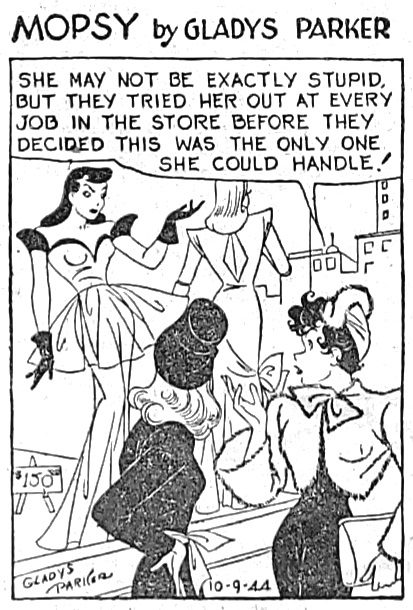
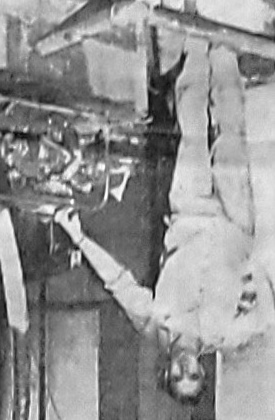 Corp. Linnard Ugstad with the ice plant he and other GIs built at an Assam ATC base.
Corp. Linnard Ugstad with the ice plant he and other GIs built at an Assam ATC base.